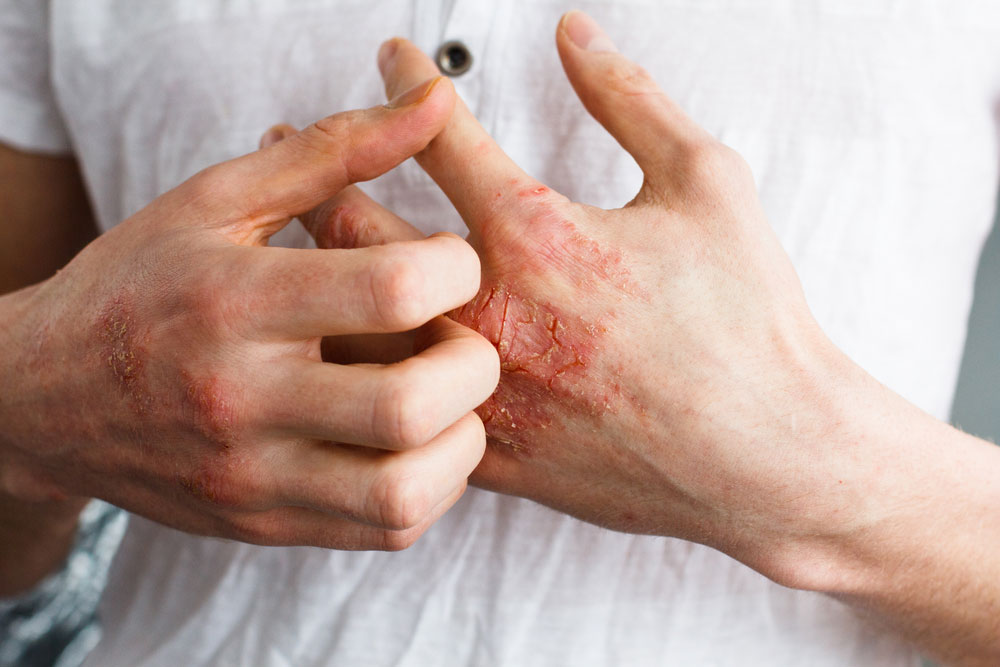Millions of people worldwide – approximately 20 % of children and up to 3% of adults – suffer from eczema, a skin condition that can negatively impact quality of life and self-esteem.
Eczema causes skin inflammation. Skin becomes red, itchy, and dry and thickened, and scaly patches may appear. The most commonly affected areas of the body are the face, scalp, hands, elbows, legs, and backs of the knees.
Sometimes the itching is so intense that it leads to scratching and more inflammation. Severe scratching may cause bleeding and skin infections.
The causes of eczema are not yet fully understood. It is believed to be related to genetics, immunity, and environment. Those with a family history of eczema, or children with other allergic conditions such as asthma or hay fever, are at a higher risk of developing eczema.
The condition is not contagious, and some children may outgrow it during adulthood.
Eczema triggers
A good way to manage eczema symptoms is to understand and avoid what triggers them:
- Chemicals found in household and personal care products
- Dust mites and animal dander
- Excessive perspiration
- Food allergies
- Sitting on grass
- Stress
- Swimming in chlorinated pools
- Synthetic fibers
- Weather conditions
- Wool
For example, it is quite common for eczema to flare up during winter months. In cold weather, the skin becomes drier, uncomfortable, and itchy. Respiratory infections and colds can trigger eczema. But hot, dry weather can also lead to flare-ups.
Mainstream Eczema treatment
While there’s no cure for eczema, its symptoms can be controlled. Treatment focuses on reducing inflammation and itching and include medications and lifestyle modifications. The standard medications include corticosteroids and antihistamines.
One important step is to keep the skin well-moisturized year-round. Maintaining skin integrity, to avoid broken or infected skin, is another important step.
Because the symptoms of eczema can be embarrassing, and stress can cause flare-ups, it is important that anyone who suffers from the condition learns to reduce and manage stress.
The natural option: essential oils
If you’ re looking for a natural way to ease the symptoms of eczema, aromatherapy is an excellent option.
One important benefit of essential oils is their ability to reduce itching and scratching, due to their anti-inflammatory and anti-allergic properties.
Essential oils can also heal and regenerate skin, reduce the risk of skin infections, and reduce stress levels.
Many essential oils can be used in eczema, these are some of my favorites:
German chamomile, for its anti-itching and anti-inflammatory effects
Fine lavender, for its calming, anti-inflammatory, and antimicrobial properties
Helichrysum italicum, for its powerful anti-inflammatory and skin regenerating actions
To apply these essential oils to your skin, you first mix them with a carrier oil. These play an important role in the relieve of eczema because they moisturize and nourish the skin, promote skin elasticity and cell regeneration, and protect the skin against external factors, leaving it soft and smooth.
My favorite carrier oils are:
Rosehip oil – high in omega 3 and vitamin A, with strong anti-inflammatory and regenerating effects
Borage oil – rich in gamma-linolenic acid, with protective and anti-drying effects
Calendula oil – calms inflammation and soothes the skin
Shea butter – protects and nourishes dry skin
Finally, here are some tips to avoid eczema flare-ups:
- Manage stress and practice relaxation techniques.
- Avoid sudden changes in temperature or humidity.
- Use a humidifier if air is too dry.
- Moisturize frequently, and not just in winter!
- Apply moisturizing blends after bathing, when the skin is still damp: this helps to retain moisture.
- Stay away from irritating materials, detergents, and personal care products.
- Avoid overheating and bathing in hot water for long periods.
- Be aware of foods that may cause an outbreak.
- Get enough sleep.
- Avoid excessive perspiration.
If eczema symptoms worsen, do not hesitate to consult your health professional.

